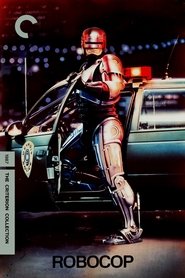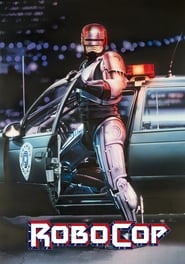Reaction - RoboCop [Vlog]
Wiki Article
As a fan of Paul Verhoeven's Robocop, I find it difficult to separate myself from the film's plot. In every manner, Robocop rocks!
A police officer named Murphy (Peter Weller) has just been moved to one of the city's most dangerous places. In the middle of the night, he and his new partner, Officer Lewis (Nancy Allen), respond to a call that leads them into a fight with Clarence Boddicker (Kurtwood Smith) and his gang, who are easily the most vicious criminals in the whole city of Detroit. Murphy is cornered and killed by Boddicker's men in a warehouse that hasn't been used in a long time.
There's more to Officer Murphy than meets the eye at first.
But is Robocop actually a machine or will his “human” history haunt him?
Robocop is a great mix of sci-fi and action. It has a lot of great scenes. The first fight between Murphy and Boddicker's gang is bloody as hell. Boddicker shoots Murphy's hand off with a shotgun. Verhoeven shows us every bloody part of it (in the uncut version, anyway). Another very graphic scene takes place in the Omni Corporation's board room, where Dick Jones is showing off his favorite project, the ED-209, a huge robot with a lot of weapons. There are still some problems with the ED-209, which become clear when it blows away Kinney (Kevin Page), the young executive who agreed to be a test subject.
But, as thrilling as the action is, Robocop is about more than just shootouts and showdowns. We experience the "creation" of Robocop from his point of view in one of the film's most spectacular scenes (those moments when, early in the transformation process, he regains consciousness). We watch much of what happens while strapped to a table in the Omni laboratories; at one point, Robocop wakes up while the technicians and medical professionals are celebrating the New Year.
Movie Reviews
As if that weren't enough, Robocop explores what it means to be human by showing what happens when your body but not your memory are transformed. Verhoeven's film has a lot to say about the human condition by focusing on such issues as corporate greed, widespread crime, and one's own personal identity (which comes into play when Robocop / Murphy begins recalling his past before to the suit.)
If you don't, enjoy the carnage!
Because the scene comes out of nowhere in a movie that looked like it was going to be a serious thriller, it throws us off guard. We don't know where "RoboCop" is going any more, and that's one of the movie's best things, too.
He thinks he can make better police officers by using robots and human brains. This is what the young scientist thinks. Then Peter Weller, a hero cop, is killed in the line of duty. He gets his chance. Well, I'm not dead. As long as there is a human core, the first "robocop" is built around it. It is a hybrid of man and machine with perfect logic, but it still has some human spontaneity and intuition lurking in the background.

Nancy Allen is in the movie as a woman cop who was Weller's partner before he was shot. She is in the movie as well. She sees something familiar about the robocop, and soon she knows what it is: Weller, her old partner, is inside that suit of steel. It should have been easy for her to figure that out, because Weller's original nose, mouth, chin, and jaw can be seen. Batman and Robin say that if you can't see the eyes of someone you know, you won't be able to recognize them. His inventor, on the other hand, seems to agree with them.
I burst out laughing. No one else had done so. The objective of the robotic audio style was clear: to make the directives seem to come from a pre-programmed authority that could not be appealed to, despite the fact that the recorded message could have been produced in a normal human voice. The contradiction between that totally confident voice and the progressively bewildered person behind it gets a lot of mileage in "RoboCop," thanks to Verhoeven and Weller.
RoboCop hit theaters on July 17, 1987. The picture earned $8 million in its first weekend from 1,580 cinemas, an average of $5,068 per theater. It was the weekend's top feature, beating off a re-release of 1937's Snow White and the Seven Dwarfs ($7.5 million) and the horror sequel Jaws: The Revenge ($7.2 million). RoboCop remained #1 with $6.3 million more than Snow White ($6.05 million) and Summer School ($6 million). RoboCop earned $4.7 million in its third weekend, behind only La Bamba ($5.2 million) and the horror films The Lost Boys ($5.2 million) and The Living Daylights ($11.1 million).
1987 achieved a box-office record of $1.6 billion, slightly surpassing the previous record of $1.58 billion set in 1984, thanks in part to increased ticket prices and an additional week of theatrical summer. Unlike the previous summer, when many blockbusters such as Ghostbusters and Indiana Jones and the Temple of Doom were released, the summer of 1987 only had one: Beverly Hills Cop II. Nonetheless, a number of films, notably RoboCop, had fared well, grossing a total of $274 million, a 50% increase over 1986. The average audience age continued to rise, while teen-oriented films like RoboCop and Beverly Hills Cop II had a 22 percent reduction in box office performance when compared to comparable 1986 titles. The income for adult-oriented films increased by 39%. RoboCop was one among the summer's unexpected triumphs, and it helped Orion's fortunes improve.
Response to the Situation
RoboCop's sole human warmth, according to Variety's assessment, is provided by Nancy Allen

A different director's vision would have resulted in a bland action picture, according to The Washington Post. Verhoeven's European filmmaking style lacked rhythm, suspense, and pace, according to Dave Kehr and the Chicago Reader, who deemed the picture overdirected. Aryan blandness was misrepresented in RoboCop by Verhoeven's usual ability to express the "sleazily psychological" via physicality. With his enormous clothing, Weller was commended by both the Washington Post and Roger Ebert for his portrayal, which evoked pity, chivalry and vulnerability. And his death became even more horrific because of Weller's beauty and elegance, according to The Washington Post. In contrast, Weller "hardly registered" for the Chicago Reader. Variety called Nancy Allen the film's sole human warmth and Kurtwood Smith a well-cast "sicko sadist"
The film's most successful effort, according to Kehr and The Washington Post, was its satire of corporations and interchangeable use of corporate executives and street-level criminals, depicting their unchecked greed and callous disregard alongside witty criticisms of subjects like game shows and military culture. The Los Angeles Times wrote that the typical cliché revenge story is transformed by making the protagonist a machine that keeps succumbing to humanity, emotion, and idealism, and that some reviewers praised the film's adaptation of a classic narrative about a tragic hero seeking revenge and redemption. The triumph of RoboCop was deemed satisfactory by The Los Angeles Times and The Philadelphia Inquirer because it provided a narrative of a noble guy battling back against corruption, evil, and the stealing of his humanity, with morality and technology on his side. According to the Washington Post, the film's ""With all our flesh-and-blood heroes failing us—from brokers to ballplayers—we need a man of mettle, a true straight shot who doesn't mess about with Phi Beta Kappas and never sticks anything up his nose," Murphy says in "Heart." 'RoboCop' is exactly what the world needs."
references: Decker Shado @ Riffs and Reviews
https://themoviedb.org Report this wiki page
